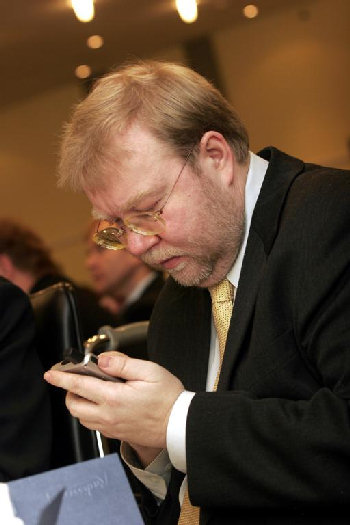
He became Prime Minister at the age of 32. When together with his 27-year minister of foreign affairs, he went to represent Estonia at the OSCE summit, security did not want to let him in claiming that he was too young to be a delegate.
Mart Laar, Prime Minister in 92-94 and again 99-02, the driving force behind Estonian economic reforms, came to Poland to promote his book „Estonia: Little Country That Could”. His advice can be useful in Poland, as well.
Piotr Manowiecki: In the rankings of Transparency International, Estonia ranks among the top thirty least corrupt countries in the world. How was it possible to achieve this?
Mart Laar: In the beginning we had to cut ourselves off from the past. We got rid of communists from the public administration and removed members of KGB from the special forces. The second step was to put into effect, real reforms. An open economy, based on competition is the best way to fight corruption. Corruption is connected with the spending of public funds. It shows itself when it becomes possible to receive something “extra” from the government.
The law must clearly identify the conditions, for giving out permits, so that officials will not be able to decide as they please. The government, on the other hand, must make decisions quickly, so that there won’t be any place for speculation and bribes which are connected with it.
Central anti-corruption departments are not the solution then?
They are a possibility, but only after carrying out reforms, and the passing of transparent and clear laws. Otherwise they are more reminiscent of medieval burnings of convicts at the town square; they bring applause but do not reduce the phenomenon.
You disbanded intelligence services, inherited from Soviet times. In Poland this subject is still very current when it comes to military intelligence.
We did this right away. At the very beginning we passed a bill defining the liability of secret services to the Parliament. No one who worked for those services, during the Soviet times, can work for them today. One never stops being a KGB officer.
A very specific characteristic of Estonian politics is the participation of young people in the government. Didn’t the members of your first government lack in experience?
No they didn’t. This has its advantages and disadvantages. Young people do not hang on tightly to their political careers. They know that sooner or later they will go back to their regular lives. They do not conduct intrigues to remain in politics forever. They have more courage to change, since they are stupid and do not know how the world works. They do not listen to „wise” people who tell them that their ideas are impossible to carry out. This ignorance sometimes helps.
This is where your courage to be the first in Europe to introduce linear tax probably comes from?
Absolutely true!!
How did you manage to convince your left-wing coalition members and the society in general that your idea had merit?
I wrote it down in the coalition agreement. It is good to publicize coalition agreements, so that the public can know what to expect. Reforms must be conducted during the first year of governing, only then is there a chance for the coalition to last. I did not have much time to convince public opinion, which was mainly opposed to my idea. The opposition was also against it. However, when we introduced linear tax, people found out that it actually works, and they liked the idea. Even the government which came after us, promising to get rid of linear tax, actually kept it.
Russia keeps claiming that in 1940 it „freed the peoples of the Baltic nations” and that the annexation of Lithuania, Latvia, and Estonia only came about at the explicit request of those nations, do Russian politicians really believe this?
Some do. They do not want to admit, because they know what effects the revolution brought about. However for Estonia this isn’t the most important problem. We know our history very well, we are independent, and we do not want to dwell on the past. I am only worried about the attitude of Russia. If a nation doesn’t want to come to grips with its own history, it cannot build the future, because it lives in a void. This is what I can see in Russia. The Russians have a complex of the past, which causes them to be unable to apologize for their faults. Whenever I go there, I try to convince them that it’s good to admit to one’s history, because Soviet repressions were directed towards Russians more than towards anyone else. I think that neither the world, nor the Russians understood what really happened. The reception of Anne Applebaum’s book „Gulag: A History” is proof that Russia is trying to evade its past. The problem is the approach to communism as a whole. I’m glad that I cannot buy shirts with a portrait of Hitler in any European capital, unfortunately those with Stalin’s portrait I still can.
In May of 2005, President Arnold Rüütel decided to protest against this portrayal of history and along with the president of Lithuania did not take part in the annual celebrations commemorating the ending of Word War II in Moscow. Russia could have punished Estonia by not signing a border treaty with your country. They didn’t. Why?
Ah, but they did!! The signature was removed. The problem of the Russians is that, they have trouble comprehending reality. For us, a border is the only thing that really exists, they only thing we are willing to defend. The Russians think that a border will change if some border posts are removed. However, the border treaty isn’t something that we are losing sleep over.
In Poland, the building of the pipeline Russia – Germany on the bottom of the Baltic Sea caused a great commotion. Estonian politicians considered widening their sea boundary in order to stop its construction. It this idea still being talked about?
We are considering this option. However it will not be easy, since such an act would require us to sign agreements with all of our neighbors. It’s not certain how it will end, especially since the government doesn’t wholly support the idea. The most important lesson to learn from all this, is that all of us were too quiet. We were all watching, when the matter began, and continued watching as it developed. Our objections came too late. We were not able to combine our efforts. Protests in arrears are senseless. It is impossible to forbid something that has already been signed.
In your opinion how is it possible to solve the Byelorussian situation?
The situation is really difficult. First and foremost we are trying to teach and convince the Byelorussians that the only way to succeed is to unite. In Ukraine it took ten years. Only thanks to unity was it possible for the Ukrainian opposition to succeed. The divisions which are visible in the Byelorussian opposition only strengthen Lukashenka.
Translator: Szczepan Witaszek









